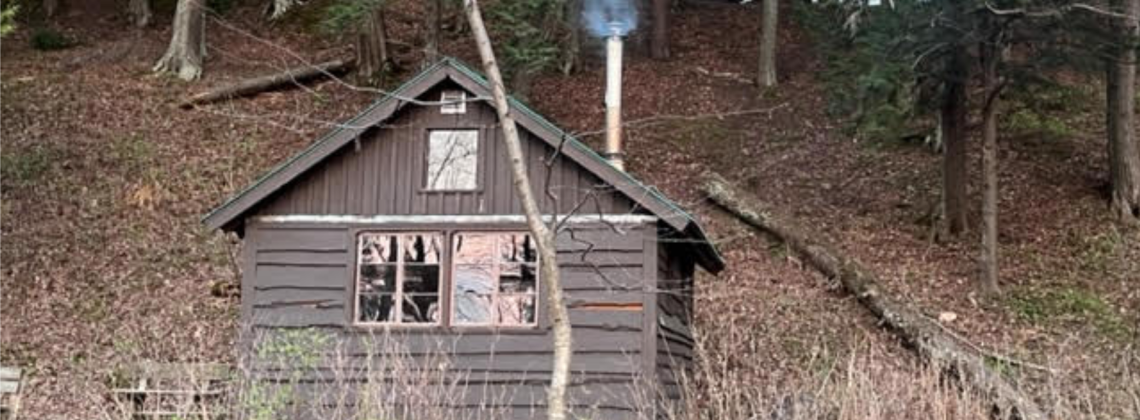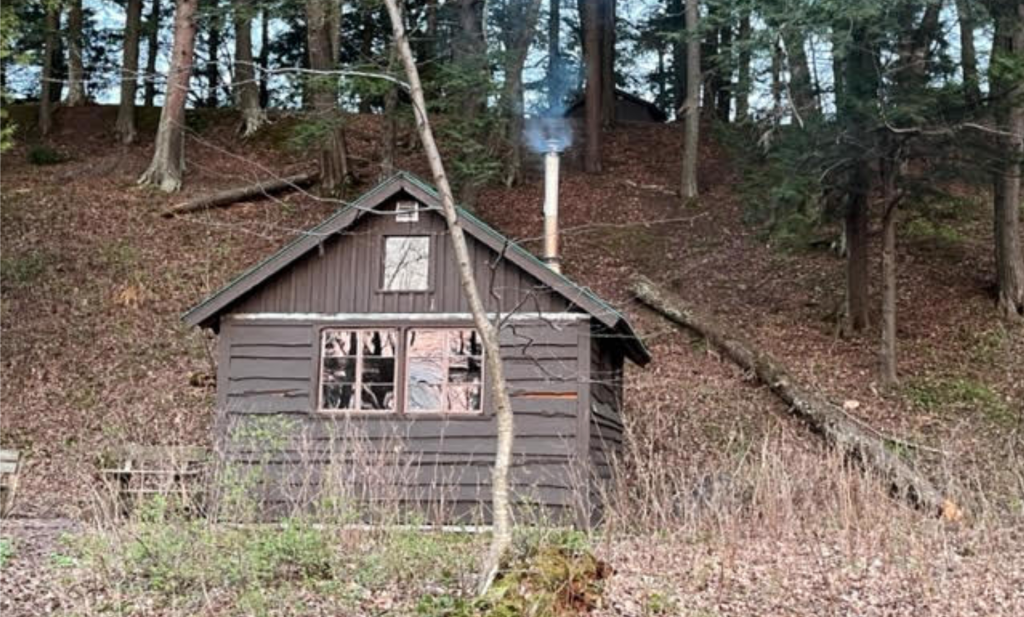

Close the eyes of the tourist. Open the eyes of the soul.
With this essay we continue our summer series “Oh The Places We Went.” It may be the last vestige of childhood in the souls of grown-ups, but summer somehow feels different from the rest of the year. Summer may involve travel or it may mostly just involve a different schedule at home, especially for those of us with kids or who work in the education sector. In this series, we collect stories and reflections that consider these summertime adventures in all their complexity and simplicity.
*
I went to the Porkies because I wished to live deliberately, to front only the essential facts of life—if only for five days and four nights. It worked.
The Porcupine Mountains are actually big hills that span the northwestern Upper Peninsula of Michigan, near the shore of Lake Superior. The Michigan Department of Natural Resources has maintained a state park there since 1944. My friend and hiking companion, Jana, has visited over twenty times. This May was my first visit, and I hope not my last.
The park requires reservations for its several rustic and charming cabins, most of them requiring a hike of a least a few miles to reach. The cabins are like Thoreau’s must have been but designed to sleep more people. There is no electricity or water. They have bunk beds, a cast-iron wood-burning stove, a fire pit outside, and a nearby outhouse (usually composting). They each have a guest log, where you can read reports of the most recent visitors and add your own. Children like to name the mice who visit the cabins during the night; adults focus on the horrific black biting flies or give advice on how to warm lake stones on the stove and wrap them for your sleeping bag at night.
Academia can make you feel like a brain on a stick, so when I was in my twenties I sought out activities that pushed me to my physical limits: half-marathons, winter tent camping, that sort of thing. Now in my fifties I have a much deeper awareness of what I need from these challenges. After I took a dip in the frigid Big Carp River one afternoon, I thought of how Thoreau said he bathed in Walden Pond every morning as a “religious exercise.” Then it hit me: I seek places that help me remember how to inhabit time.
It doesn’t take much to recognize that our culture’s relationship with time is broken. Efficiency, or what Jacques Ellul called “the rule of technique,” is the primary goal in every area of activity. We seek efficiency not to create space for soul development but so that we can be even more productive. We value doing over being. The culture of total work has eroded our souls, grounded them down to the nub. Since work leaves us exhausted we have no energy to pursue leisure activities—re-creation. Instead, we amuse ourselves to death by streaming Netflix or numbing ourselves with food and drink. We have been unwilling or unable to heed the warnings of several prophets of being: Thoreau or Ellul or Josef Pieper. In Leisure the Basis of Culture, Pieper tells us that leisure is not necessarily present when we’re on vacation—because it is a condition of the soul, not an activity on a calendar. We must cultivate stillness and quiet so that the soul can respond to what is real: who we really are. Why we are here.
There is nothing about hiking and camping that is efficient in the modern sense. You cannot be in a rush. It takes time to select what to pack, to balance your pack, to plan meals so that your heaviest items get eaten first. On your first hike in you are thankful you re-broke in your hiking boots, but even still you will be forced to stop for adjustments. My friend had to attend to her toe that rubbed the wrong way in her boot. My knees needed several stops for rest. I failed to close my water membrane correctly, causing a leak, so we had to take time to fix that and set my sleeping bag out to dry.
When you finally get to the cabin, you’ve got to make a fire for the cool early May evenings. Though some wood might be left for you, you need to leave some for the next guests. You cut fallen branches with the cabin saw, scour the shoreline for driftwood. Then you must plan for water. You collect it from the lake, then boil or filter it with a portable filter. Cooking food on a tiny camp stove requires planning to save fuel. One morning we got the wood-burning stove really hot and cooked pancakes in a pan laid directly on its surface. While we waited for the bubbles we talked, laughed, drank instant coffee and tea. We didn’t leave for a hike until after 9 AM.
Depending on the amount of stress in my life just prior to a trip like this, it takes a bit to remember how to live deliberately and quietly enough to make space for the real. After one night in the Porkies I felt my eyes and ears begin to open. I spent (I’m guessing) twenty minutes watching two Bald Eagles fish in the river and the lake. They didn’t catch anything, and left. We took day hikes, stopping for anything that caught our eye. While looking for two sets of named falls on the Big Carp River (Bathtub Falls and Shining Cloud Falls), we saw so many more that we began to make up our own names for them. We saw ferns just beginning to unfurl. We observed the early spring ground cover visibly changing by the day. I rarely turned my phone on; I did so occasionally to use the Merlin app to listen for birds, discovering that the Black-throated Green Warbler was our most frequent musical companion.
The only other time I turned on my phone was to listen to an audio recording of Walden. I’ve read or heard it maybe twenty times, but as I lay on my bunk while the sun was shining into our cabin as it set over Lake Superior, it came to life in a new way. Thanks to my beloved professor William Howarth, Walden has been such an important touchstone that I have come to question people who don’t get it—those who say Thoreau was selfish or criticize him for bringing laundry to his mother, as if wilderness survival was his primary goal. It wasn’t. His goal was to live deliberately. Simply to be. Once you simplify your life down to the bare necessities, he explains, you free your mind for transformative growth. One of my favorite passages from Walden is this one:
Sometimes, in a summer morning, having taken my accustomed bath, I sat in my sunny doorway from sunrise till noon, rapt in a revery, amidst the pines and hickories and sumachs, in undisturbed solitude and stillness, while the birds sing around or flitted noiseless through the house, until by the sun falling in at my west window, or the noise of some traveller’s wagon on the distant highway, I was reminded of the lapse of time. I grew in those seasons like corn in the night.
Thoreau recovers the “unforced rhythms of grace,” the lovely phrase from Eugene Peterson’s paraphrase of Matthew 11. “Keep company with me,” says Jesus, “and you’ll learn to live freely and lightly.” This lightness enables us to grow like corn in the night. We are the ones who add baggage.
My trip to the Porkies reminded me that places won’t change us unless we stay long enough to close the eyes of the tourist and open the eyes of the soul. I knew that my trip had succeeded at this when I arrived home. I had been slowly reading a collection of poems by Adam Zagajewski, and this one was next:
Late Feast
Evening, the edge of the city, a whole day
of void, then all at once
the late feast: the Sanskrit of dusk that speaks
in a glowing tongue of joy.
High overhead flow cigarette firelets
no one is smoking.
Sheets of blazing secrets aflame;
what the serenely fading sky tells
can’t be remembered or even described.
So what if Pharaoh’s armies pursue you,
when eternity is woven
through the days of the week like moss
in the chinks of a cabin?
We live as if Pharaoh’s armies are in hot pursuit, even when they are not. But even when they are, we always have a choice in how to respond. For whatever place we call home, the skies above provide a feast for the soul—a reminder of eternity. They speak in a glowing tongue of joy. We just have to slow down long enough to hear it.
*
I would like to dedicate this essay to Professor William Howarth, who died in June, and his surviving wife, Anne Matthews—both excellent teachers. Over thirty years ago, Professor Howarth opened a shining new world for me by helping me to encounter Emerson, Hawthorne, Melville, Dickinson—and especially Thoreau. He was among the most creative and passionate teachers I have ever had. He was patient with my undergraduate naïveté, and never made me feel small for all I had yet to learn. I cannot thank you enough, Will and Anne, for introducing me to the joyful scholarly life I’ve come to inhabit.
Christina Bieber Lake is the Clyde S. Kilby Professor of English at Wheaton College, and the author of Beyond the Story: American Literary Fiction and the Limits of Materialism.